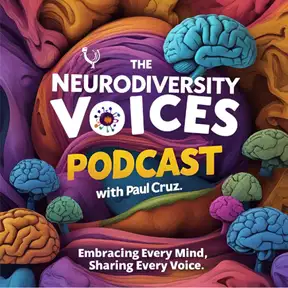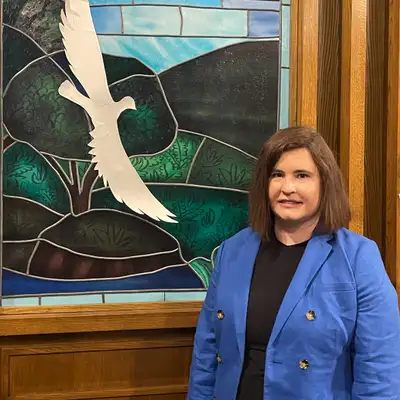Host Paul Cruz sits down with poet and mental health advocate Samantha Merz. Samantha shares her journey of discovering poetry at 19, how her neurodivergence influences her creative process, and how writing became a powerful outlet for expressing emotions like loneliness and resilience. From her published collections, Kazoo and Meadowlite, to her newest book, Only You Will Do, Samantha opens up about the challenges and triumphs of being a neurodivergent creative.
She also discusses the importance of mental health advocacy, the role of community programs like Thrive Open Door and Coast Mental Health, and how activities such as singing in a choir and playing badminton enrich her well-being. This inspiring conversation highlights the power of creativity, community, and perseverance in building a more inclusive world.
What You’ll Learn in This Episode:
- Samantha’s journey into poetry and how her first published work motivated her to keep writing.
- How neurodivergence shapes her creative process and themes like loneliness, resilience, and self-discovery.
- The stories behind her poetry collections, Kazoo, Meadowlite, and Only You Will Do.
- The challenges of promoting creative work while balancing a career.
- The impact of online poetry communities and local support groups on her growth.
- How activities like choir and badminton support her mental health and creativity.
- Her advice to neurodivergent individuals hesitant to share their creative work.
- Practical encouragement for aspiring poets exploring mental health and self-discovery.
Guest Bio – Samantha Merz:
Samantha Merz is a poet and advocate whose works explore themes of neurodivergence, resilience, and mental health. She is the author of three poetry collections — Kazoo, Meadowlite, and Only You Will Do. Alongside her writing, Samantha is actively involved in community groups such as Thrive Open Door and Coast Mental Health, where she supports and uplifts others. Through her blog, Instagram, and poetry, she inspires neurodivergent voices to be heard and celebrated.
Samantha Merz is a poet and advocate whose works explore themes of neurodivergence, resilience, and mental health. She is the author of three poetry collections — Kazoo, Meadowlite, and Only You Will Do. Alongside her writing, Samantha is actively involved in community groups such as Thrive Open Door and Coast Mental Health, where she supports and uplifts others. Through her blog, Instagram, and poetry, she inspires neurodivergent voices to be heard and celebrated.
Connect with Samantha:
- Website: SamanthaMers.wordpress.com
- Instagram: @SamanthaMers
- Facebook: Samantha Mers
- Books available at: Blurb Bookstore
Connect With Us
- Learn more about Neurodiversity Voices Podcast: www.neurodiversityvoices.com
✨ If this episode resonated with you, please subscribe, rate, and share The Neurodiversity Voices Podcast with your community. Together, we can keep amplifying diverse voices and celebrating the beauty of different minds.
Instagram, Facebook Page, YouTube, Substack: @neurodiversityvoicespodcast
LinkedIn: https://www.linkedin.com/company/neurodiversityvoicespodcast
Transistor.fm: https://theneurodiversityvoicespodcast.transistor.fm/
Bluesky: https://bsky.app/profile/tnvp.bsky.social
Be Our Next Guest on The Neurodiversity Voices Podcast!
Do you have a story, insight, or experience that could inspire and empower the neurodiverse community? We’re looking for passionate voices—self-advocates, professionals, educators, parents, and allies—who want to share their journey and spark meaningful conversations.
✨ If you’re ready to highlight your perspective and contribute to a platform that celebrates neurodiversity, we’d love to hear from you!
👉 Apply now to be a guest: https://www.neurodiversityvoices.com/be-our-podcast-guest
Let’s amplify neurodiverse voices—together. 💜
Chapters
00:00 The Journey into Poetry
03:36 Community and Mental Health Advocacy
07:00 Imagery and Vulnerability in Poetry
08:35 Introduction to Neurodiversity Voices Podcast
Disclaimer:
The content provided in this podcast is not intended to be a substitute for professional medical advice, diagnosis, or treatment. Always seek the advice of your physician or other qualified health provider with any questions you may have regarding a medical condition. Never disregard professional medical advice or delay seeking it because of something you have heard on this podcast.


